Wellness Lab Testing
Hormone Panels : Thyroid
Thyroid-Stimulating Hormone (TSH) - Evaluates overall thyroid function and thyroid antibodies
- Total T4 - Measures the total amount of T4 produced by the thyroid gland
- Total T3 - Measures the total amount of T3
- Reverse T3 - Measures the non-functioning form of the active hormone T3
- Antithyroglobulin antibody (ATA) - Often measured along with TPO, these antibodies can attack proteins involved in the production of thyroid hormones rendering them dysfunctional
- Thyroid Peroxidase antibody (TPO) - Often measured along with ATA, these antibodies can attack proteins involved in the production of thyroid hormones rendering them dysfunctional
Male/Female Comprehensive Panels
Dutch Complete
What is the Dutch Complete Hormone test?
Precision Analytical labs developed this unique test. It measures your hormone metabolites from dried urine samples. The hormones include:
- Cortisol
- Cortisone
- Estradiol
- Estrone
- Estriol
- Progesterone
- Testosterone
- DHEA
- Melatonin
This test also measures your cortisol and cortisone rhythms and levels, and your estrogen metabolism pathways.
Why measure all these hormones?
There are lots of reasons!
- If you have“adrenal fatigue/upregulated HPA axis,” sleep or stress issues, testing your adrenal hormones and their rhythms gives specific information about how to handle these problems. We are specifically looking at your adrenal-brain communication, known as your HPA axis (hypothalamus-pituitary-adrenal).
- With fertility problems, polycystic ovarian syndrome (PCOS), fibroids, PMS, irregular periods, painful periods, anxiety and moodiness, and endometriosis, this test is highly beneficial. It gives a complete picture of how adrenal and reproductive hormone imbalances contribute to these problems.
- If you use hormone replacement therapy, you want to monitor your levels. This test works uniquely well for oral progesterone,vaginal hormones, patches, pellets and injections. Note that this is only for hormone replacement therapy, not hormonal birth control pills!
- With sleep problems, it’s important to check melatonin. Melatonin can be low and related to your sleep problems, or it can be normal.
- You may have low DHEA levels. This is a “feel-good” hormone produced by your adrenal glands. When it’s low, it can cause fatigue, a decrease in muscle mass or bone density, depression, aching joints, loss of libido, and lowered immunity.
- You may have “estrogen dominance.” This is when the scales are tipped so that progesterone is low and estrogen is high. Estrogen dominance can be a factor in endometriosis, PMS, painful periods, fibrous breasts, fibroids, tender breasts, moodiness, and more. It can make perimenopause symptoms significantly worse.
- This test shows how you metabolize estrogen through your liver. If you don’t metabolize estrogen well, your risks of estrogen-related cancers such as breast, cervical and uterine cancer can increase.
New Additions!
New markers are now included on the Dutch test (as of 2018). These include: The three B vitamins that are most commonly low: B12, B6 and Folate. A marker for oxidative stress. If this is high, it’s important to identify the sources, and to check your mitochondrial function to make sure oxidative stress has not affected the structure and function of these energy-producing organelles. Neurotransmitters that show dopamine and first responder stress hormones (epinephrine and norepinephrine). Most importantly, your body’s level of glutathione, which is THE most important anti-oxidant that you make. You will not detox well or use omega 3 fats properly with low glutathione. It’s often tanked if you have a high level of environmental chemical exposures, such as living next to a golf course or agriculture.
Learn More : Female Sample Learn More : Complete PaperDUTCH PLUS
DUTCH PLUS KEY ADVANTAGES
- Takes hormone testing to a whole new level: Dutch Complete + Cortisol Awakening Response (CAR)
- Includes Metabolites of Estrogens, Androgens, Progesterone, Cortisol, Melatonin, Adrenaline, Noradrenaline and 8-OHdG.
- The diurnal pattern of Free Cortisol and Cortisone are also provided, including the Cortisol Awakening Response. An optional nighttime Insomnia Cortisol measurement is also available.*
The DUTCH Plus™ takes hormone testing to a whole new level. In addition to sex hormones and their metabolites, the DUTCH Complete looks at the overall diurnal pattern of free cortisol, and the total and distribution of cortisol metabolites. The DUTCH Plus adds the Cortisol Awakening Response (CAR) to bring another important piece of the HPA-axis into focus.
DUTCH Plus™ is a game changer in the world of hormone testing. It provides the most comprehensive look at adrenal and sex hormones available in one test, which means more accurate diagnoses and more effective treatments.”
-Chris Kresser
New York Times Bestselling Author and Founder of the Kresser Institute for Functional and Evolutionary Medicine
What is the Cortisol Awakening Response and how do we test for it?
When we open our eyes upon waking, cortisol levels naturally begin to rise by an average of 50%. 30 minutes after waking, cortisol levels will still show this sharp increase. By 60 minutes after waking, cortisol levels have peaked and begin to decline. Measuring this rise and fall of cortisol levels at waking can be used as a “mini stress test”. Research shows that the size of this increase correlates with HPA-axis function, even if the sample measurements are all within range. A quick saturation of saliva swabs upon waking, and at 30 and 60 minutes after waking, provide what is required to assess a patient’s Cortisol Awakening Response.
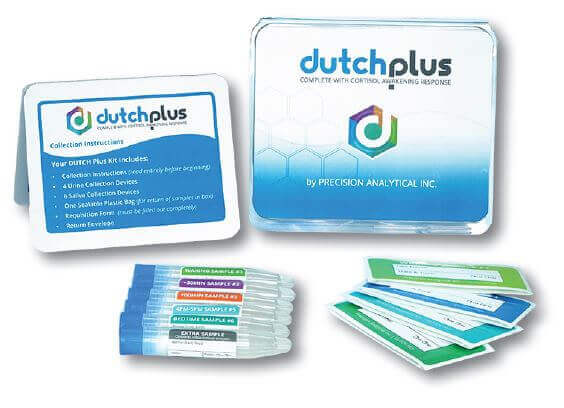
A low or blunted Cortisol Awakening Response can be a result of an under active HPA axis, excessive psychological burnout, seasonal affective disorder (SAD), sleep apnea or poor sleep in general, PTSD, chronic fatigue and/or chronic pain. A decreased CAR has also been associated with systemic hypertension, functional GI diseases, postpartum depression, and autoimmune diseases.
An elevated Cortisol Awakening Response can be a result of an over-reactive HPA axis, ongoing job-related stress (anticipatory stress for the day), glycemic dysregulation, pain (i.e. waking with painful joints or a migraine), and general depression (not SAD). A recent study1 showed that neither the waking nor post-waking cortisol results correlated to Major Depressive Disorder, but the CAR calculation (the change between the first two samples) did. This measurement of the response to waking has independent clinical value showing dysfunction that may be hidden by current testing options.
What’s Included in the DUTCH Plus™? The DUTCH Plus™ uses four dried urine samples and five saliva samples. These samples are collected over the course of one day, from waking to bedtime.
The DUTCH Plus™ report includes:
Metabolites of Estrogens (8, including E1, E2, E3, 2-OH-E1, 4-OH-E1, 16-OH-E1, 2-methoxy-E1), Androgens (8, including Testosterone, DHT and DHEA-S), Progesterone (2), Cortisol (3), and Melatonin and 8-OHdG. The diurnal pattern of Free Cortisol and Cortisone are also provided, including the Cortisol Awakening Response and an optional nighttime Insomnia Cortisol measurement.*
What can the DUTCH Plus™ tell us that the DUTCH Complete™ and other adrenal tests cannot?
Even though a patient may have “normal” free cortisol levels throughout the day, that doesn’t always mean everything is functioning properly. The graph below shows two good examples. A blunted or exaggerated CAR can appear, even when single samples return “normal” results. The HPA axis might not be appropriately responding when faced with a stressor, even when cortisol levels are fluctuating nicely throughout the day. The “stress” of waking, allows us to test the HPA axis in a way that has been independently correlated to clinical outcomes and cannot be assessed by other cortisol tests on the market.
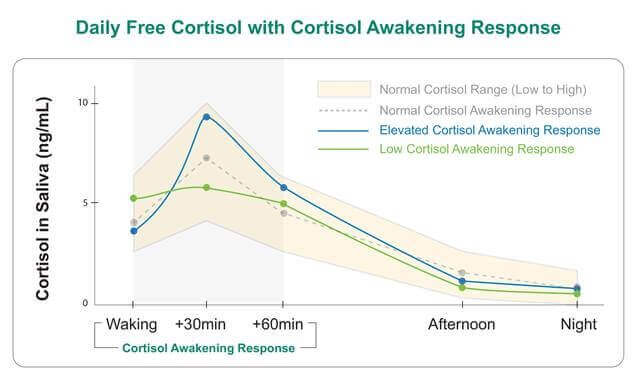
Why aren’t true Cortisol Awakening Response tests readily available?
A true CAR assessment requires salivary samples to be collected at the moment of waking, and twice more, at 30 minutes after waking and 60 minutes after waking. These specifically timed collections are difficult and impractical with urine and traditional salivary options. The DUTCH Plus™ uses specialty, FDA-approved, and patented collection devices called Salivettes™. Salivettes™ are specifically made for testing cortisol when timing needs to be precise and are used in nearly all of the published CAR studies. The small synthetic cotton swab can be quickly saturated with saliva, providing a very fast and simple collection. Unfortunately for labs using saliva to test reproductive hormones, they are not a viable option as the swabs cannot be used when testing progesterone. The DUTCH Plus™ offers the most accurate salivary cortisol sampling with Salivette™ collection and analysis using LC-MS/MS. An unparalleled clinical tool is created when combining salivary cortisol with the extensive urine metabolites from DUTCH.
ALLERGIES & SENSITIVITIES
LRA (Lymphocyte Response Assay) by ELISA/ACT
Conventional therapies for autoimmune conditions involve some combination of immune suppressive therapies. In contrast, the LRA (Lymphocyte Response Assay) by ELISA/ACT™ is a way of determining for each individual what items are burdening the immune system and a system for restoring immune competence.
The LRA tests measure all three delayed allergy pathways while avoiding false positives common in other types of delayed allergy tests.
- Reactive antibody (IgA, IgM, and IgG)
- Immune complexes
- Direct T-cell activation
Identifying the patient’s specific sensitivities and delayed allergies that burden the immune system is a clinical breakthrough. Patients often experience a dramatic improvement in the quality of their life as a result of the individualized treatment plan. After six months, a reevaluation of progress is recommended with 3 possible outcomes.
1) If patient is in full remission a guided gradual reintroduction of previously reactive items is advised
2) If patient is better but not yet well, repeat LRA tests. Since digestion, among other systems, takes time to recover, it is common for people to lose some reactive items and acquire new ones. A repeat program starting from a healthier base is likely to further improve health and sustain remission.
3) If patient reports following instructions carefully and avoiding reactive items but is still not better, look for toxins that might serve as inhibitors to recovery. If a person reports making best efforts at following the program and does not report improvement, repeat testing is not indicated.
Healthy immune tolerance means no LRA reactions.
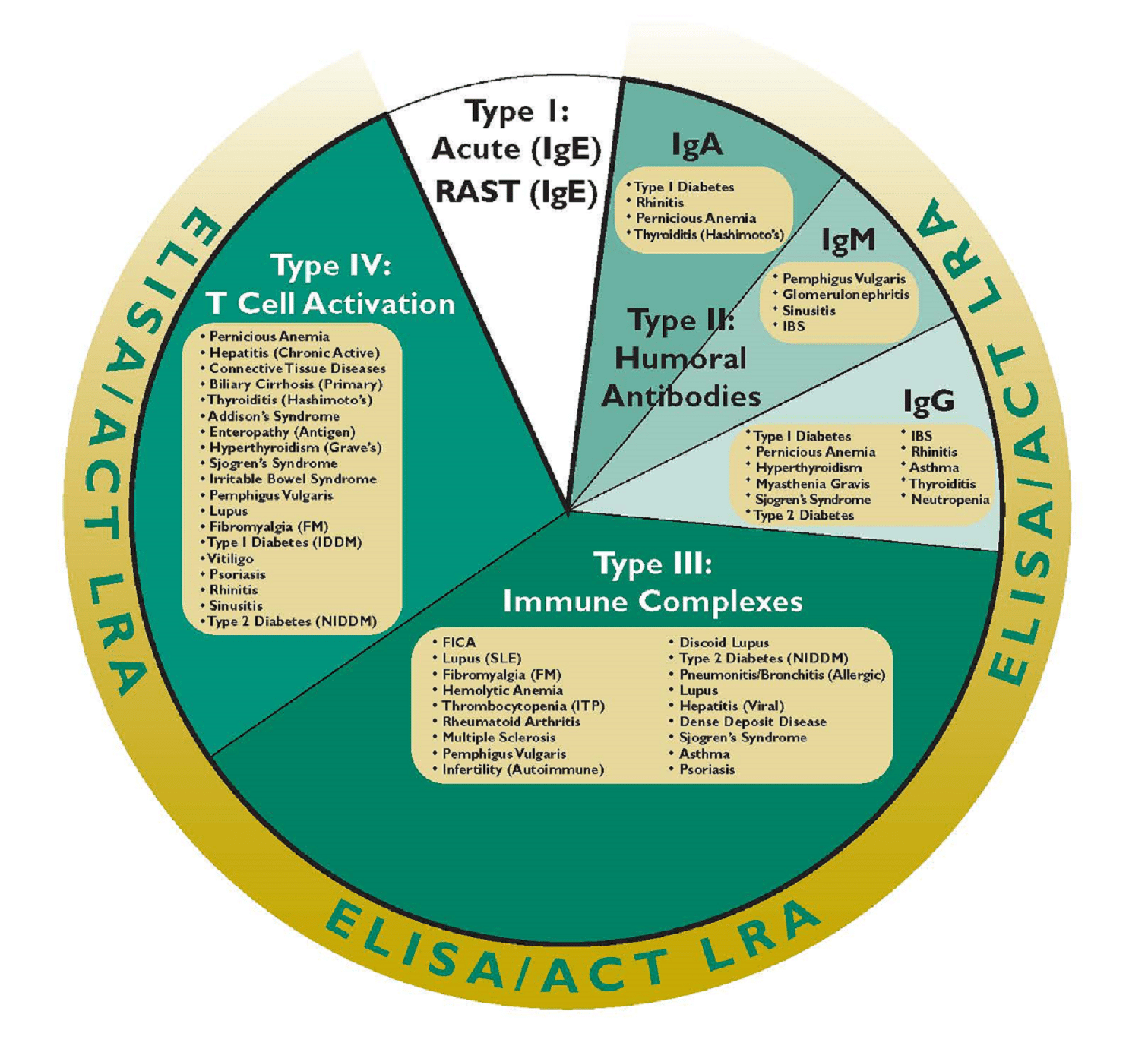
Who Can Benefit
Chronic autoimmune, immune dysfunction, and inflammatory problems deserve attention to their cause. LRA by ELISA/ACT™ (LRA) tests and interpretive treatment plans can be the key to unlocking the mystery of chronic illness.
The LRA program is designed to help people suffering from the autoimmune variants or immune dysfunction symptoms and conditions.
Gluten/Celiac Testing – Cyrex Array #3
What Doctors Are Saying About Array 3
"The Cyrex Array 3 offers the most comprehensive analysis available for determining gluten sensitivity.This array has proven incredibly valuable in my practice by providing in-depth information about an issue that has wide clinical implications."
—David Perlmutter, MD, FACN, author of the national best seller Grain Brain
Cyrex Array 10/Multiple Food Reactivity Screen
Why use Cyrex Array 10?
- To evaluate immune reactions to foods, raw and/or modified, food enzymes, lectins and artificial food additives, including meat glue, colorings and gums.
- For early detection of dietary-related triggers of autoimmune reactivity.
- To monitor the effectiveness of customized dietary protocol in patient.
TOXIC METALS & CHEMICAL TESTING
GPL-Tox
A new test for toxic organic chemical exposure and related mitochondrial disorders Metals.
Toxic Chemicals : A Major Cause of Developmental Disorders and Chronic Illnesses
Every day, we are exposed to hundreds of toxic chemicals through products like pharmaceuticals, pesticides, packaged foods, household products, and environmental pollution. As we have become more accustomed to chemical-laden products, and as our environment has become more contaminated, we have been confronted with an accelerating rate of chronic illnesses like cancer, heart disease, chronic fatigue syndrome, chemical sensitivity, autism spectrum disorders, ADD/AD(H)D, autoimmune disorders, Parkinson's disease, and Alzheimer's disease.
Because exposure to environmental pollutants has been linked to many chronic diseases, The Great Plains Laboratory has created GPL-TOX, a toxic organic exposure profile that screens for the presence of 168 different toxic chemicals including organophosphate pesticides, phthalates, benzene, xylene, vinyl chloride, pyrethrin insecticides, and others. This profile also includes Tiglyglycine (TG), a marker for mitochondrial disorders resulting from mutations of mitochondrial DNA. These mutations can be caused by exposure to toxic chemicals, infections, inflammation, and nutritional deficiencies.
Learn MoreMercury Tri Test – QuickSilver Scientific
Quicksilver Scientific®’s CLIA-certified laboratory specializes in advanced mercury speciation testing, using the patented Mercury Tri-Test. This test utilizes samples of hair, blood, and urine to assess for the body’s mercury burden and its ability to eliminate it. This test helps practitioners and patients to understand the magnitude and source of mercury exposure, as well as if additional support is needed in the process of mercury detoxification.
The Quicksilver Mercury Tri-Test is the only clinical test that utilizes mercury speciation analysis, a patented advanced technology that separates methyl mercury (MeHg) from inorganic mercury (HgII) and measures each directly. Quicksilver Scientific’s instruments are sensitive enough to measure ambient mercury levels in the body WITHOUT THE NEED FOR CHALLENGE TESTING. This laboratory test provides unprecedented information for healthcare practitioners, allowing them to assess the patient’s exposure sources, body burden and ability to excrete each form of mercury. This detailed information helps build an informed picture and allows the clinician to plan a rational approach to a successful detoxification strategy for the patient.
MERCURY TRI-TESTEXA (Intracellular mineral test)
Quality of Life studies are published in peer review journals.
- Healthcare professionals perform an office based non-invasive 60 second specimen collection. We provide the specimen collection kit.
- The specimen is sent to IntraCellular Diagnostics for processing.
- IntraCellular Diagnostic's EXA Test® offers you tissue evaluations for the intracellular status of:
- MAGNESIUM
- CALCIUM
- POTASSIUM
- PHOSPHORUS
- SODIUM
- CHLORIDE
EXA Test® allows the Healthcare Provider to monitor and screen cellular mineral electrolyte balance objectively and repeatedly and follow a patient's metabolic physical status.
EXA is the physician's noninvasive solution to the continuing problem of accurately measuring dynamic intracellular mineral electrolyte levels that impact a patient's quality of life.
EXA Test® is a reliable noninvasive method using rapidly metabolizing sublingual epithelial cells under Analytical Scanning Electron Microscopy, (ASEM,) an Energy Dispersive X-Ray Analysis, (EXA,) to reflect fast tissue changes of vital mineral electrolytes.
EXA Test® provides results that correlate with heart, muscle, and deep organ tissue.
EXA results do not correlate with blood. EXA provides information not available through blood or serum tests.
Essential mineral electrolytes are most prominent in epithelial tissue not in blood: for example, 99% of magnesium is found in soft tissue and only 1% is found in blood.
EXA Test® results assists the physician with diagnosis, treatment protocols, management of heart disease and other complex conditions where mineral electrolyte deficiency or imbalance is confirmed.
Disover More
DIGESTIVE/LEAKY GUT
Vibrant Wheat Zoomer
The Vibrant Wellness Wheat Zoomer test is designed to distinguish between celiac disease, non-celiac gluten sensitivity, non-gluten wheat sensitivity, and autoimmune processes triggered by gluten. It also includes the market’s most comprehensive biomarker panel to identify intestinal permeability (leaky gut syndrome) as well as bacterial lipopolysaccharides (LPS), which contributes to intestinal permeability.
What is Wheat/Gluten Sensitivity?
Wheat and gluten sensitivities are immune responses in which, upon ingestion of wheat or gluten (from gluten-containing grains), antibodies against the protein component of these grains are generated. Gluten sensitivity is only a subset within a much larger group of wheat/gluten-related disorders.
What is the Wheat Zoomer?
Vibrant’s Wheat Zoomer is a wellness test built to assist in the detection of wheat and gluten-related disorders. It aids in the specific recognition of antibodies to wheat peptides-including gluten and non-gluten components along with intestinal permeability. This information, in turn, allows you to reduce, manage, and monitor the inflammatory effects of those sensitivities.
Wheat Zoomer Intestinal Antibody Detection includes:
All known deamidated gliadins
- Alpha, alpha-beta, gamma and omega gliadin
- HMW and LMW glutenin family
- Zonulin protein and actin
- tTG- DGP Fusion Peptides
- Wheat germ agglutinin (WGA)
- Differential transglutaminase: 2, 3 and 6
- Non-gluten wheat proteins
- Farinins
- Globulins
- Serpins
- Amylase/Protease Inhibitors
- Total IgA and IgG
Wheat Zoomer Intestinal Permeability Panel includes:
- Lipopolysaccharide IgG/IgM/IgA
- Zonulin
- Anti-Actin IgG/IgA
- Anti-Zonulin IgG/IgA
Vibrant’s Advanced Technology
Vibrant Wellness utilizes a microchip technology, which synthesizes entire proteins as peptides and offers very specific antibody-to-antigen recognition. This results in enhanced sensitivity and specificity compared to other platforms. The Wheat Zoomer has been validated at 99% specificity and sensitivity. This technology is unique to Vibrant.
Discover More
CYREX ARRAY
2 Array 2 is an antibody assessment of the intestinal barrier integrity and bacterial endotoxins (lipopolysaccharides), tight-junction proteins (occludin, zonulin) and cell cytoskeleton (actomyosin) and identifies both transcellular (through the cells) and paracellular (between the cells) routes of intestinal barrier penetration (leaky gut) by large molecules with a capacity to challenge the immune system. Gluten causes inflammation in the gut, which can eventually lead to intestinal permeability, or “leaky gut.” Leaky gut allows undigested food particles, bacteria, and other pathogens to escape into the bloodstream where they can trigger allergies, sensitivities, and inflammation in other parts of the body. This is a main reason why people come back sensitive to many foods. Several different mechanisms cause leaky gut:
- Breakdown of cells
- Loosening of the junctures of the gut lining
- Bacterial infection
This test pinpoints which of these is causing leaky gut so your practitioner knows what to specifically target for faster and more efficient gut repair.
Learn MoreGI-MAP™ – DNA Stool Analysis by qPCR
In the last few decades, DNA analysis has transformed the field of microbiology. Almost all research of microbes utilizes DNA methodology. The National Institute of Health (NIH) has followed suit with initiatives including the Human Microbiome Project, which characterized the microbiome of 15 habitats of the body using DNA analysis. The GI-MAP comprehensive stool test was developed to provide practitioners a diagnostic tool that offers unmatched insight into a patient’s unique microbiome. The GI-MAP stool analysis evaluates the DNA of the organisms living within the gut using the most advanced qPCR technology for results you can rely on.
GI-MAP™ Enhanced with New Bacterial Biomarkers
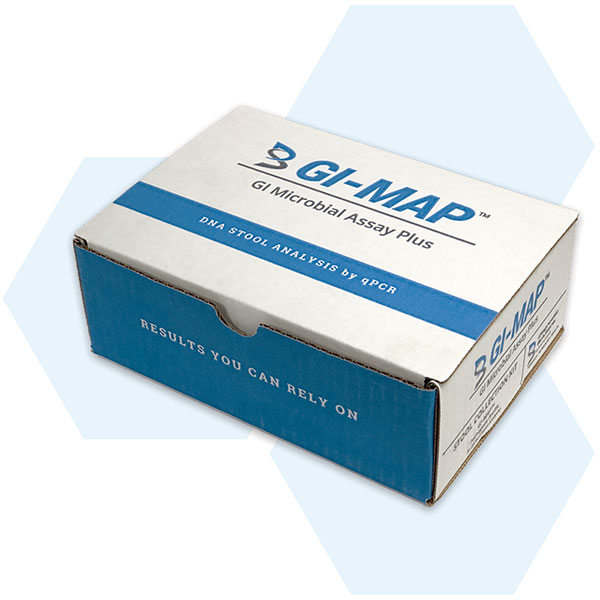
We’re expanding the GI-MAP™ to include five new bacterial biomarkers. The additions include keystone species and important groups that may impact health in a variety of ways, including: production of short-chain fatty acids, mucus metabolism, methane production, and promotion of anti-inflammatory regulatory T cells, and production of inflammatory LPS. These markers will further enhance insights into gastrointestinal and immune health provided by GI-MAP DNA Stool Analysis.
Learn More
MYCOTOXIN TESTS
VIBRANT MYCOTOXIN (MOLD) TEST
The Vibrant Mycotoxins test is a urine-based assay for 31 of the most common mycotoxins produced by molds to which humans are exposed. This test is measured on our proprietary microarray platform, to produce the most accurate and clinically relevant assessment of difficult-to-detect toxins that can cause serious disease in humans. Individuals most at risk for mycotoxin exposure include those who live or work in older buildings, those who have known exposure to water-damaged buildings, and those with impaired immune responses or higher levels of oxidative stress. Mycotoxins complicate human health in a number of ways and their presence in the human body can lead to a number of serious health concerns, including autoimmune disease and cancer.
There may be higher incidence of autoimmune or neurological symptoms in your patients with mycotoxin toxicity. Consider screening for Hashimoto’s thyroiditis, connective tissue disorders, celiac disease, and neurological autoimmunity along with mycotoxin testing. Treatment of mycotoxin exposure should include a holistic approach to eradicate the mold from the individual, thorough and professional removal of mold from environmental sources, and continued testing to monitor reductions in mycotoxin levels post-intervention. Due to the common co-occurrence of Lyme and mycotoxin exposure from depressed immunity in affected individuals, as well as symptom overlap between tickborne diseases and mycotoxins, consider running the Vibrant Tickborne Diseases panel along with the Vibrant Mycotoxins test.
What is visual contrast sensitivity testing?
Visual contrast sensitivity testing measures your ability to see details at low contrast levels and is often used as a nonspecific test of neurological function. Similar in form to a standard audiometry hearing test, a VCS test generally involves the presentation of a series of images of decreasing contrast to the test subject and the recording of the contrast levels where patterns, shapes, or objects can or cannot be identified. The results of the test can then be used as an aid in the diagnosis of visual system dysfunction.
What can cause a contrast sensitivity deficit?
Many things can affect the ability to perceive contrast. These include nutritional deficiencies, the consumption of alcohol, drug/medication use, and exposure to endogenous or exogenous neurotoxins and/or biotoxins, including volatile organic compounds (VOCs), venom from animal or insect stings or bites, certain species of mold and the mycotoxins and microbial VOCs they produce, cyanobacteria, dinoflagellates (particularly Pfiesteria and Ciguatera), apicomplexans, parasites, heavy metals like mercury and lead, and the pathogens responsible for Lyme disease and its common co-infections. For more information, please see our Research resources.
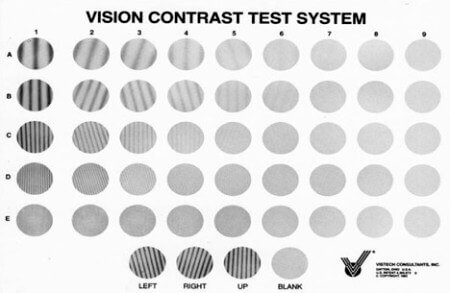
Why is VCS testing diagnostic?
VCS testing, by itself, is generally not diagnostic for any specific condition (including either mold or neurotoxin exposure), but a positive result may suggest the existence of a health and life-affecting clinical or subclinical process.
GENETICS
GENOMIC INSIGHT by Diagnostic Solutions
GenomicInsight™ reports on over 5,000 single nucleotide polymorphisms (SNPs) in one comprehensive functional DNA test. Online results include therapeutic recommendations backed by the latest medical literature from PubMed, GWAS (genome wide association study), dbSNP, HapMap (haplotype map) and several others. Data gleaned from Genomic Insight™ informatics uses the latest medical literature to provide relevant information on nutraceuticals, nutritional supplements, diet, and lifestyle interventions that can proactively influence a patient’s SNPs to reduce or prevent disease risk. Furthermore, pharmacogenomic results included in the profile allow practitioners to predict the efficacy of select pharmaceuticals tailored the individual’s genetic make-up.
Advancing Personalized Medicine Through Empowered DNA Testing
GenomicInsight™ provides a global view of the interconnectedness of SNPs and offers access to informatics that reveal lifestyle and therapeutic recommendations that may influence a gene’s expression and function. The role of genomics and epigenetics is recognized as an important tool in monitoring, preventing, and treating dysfunction. Furthermore, medical literature supports that epigenetics (the impact of the environment on gene expression) plays a critical role in human health.1 GenomicInsight™ with Opus23 Explorer™ identifies how the function or dysfunction of one gene impacts the expression and function of a separately-related gene or SNP.
GenomicInsight™ Evaluates Over 12 Key Areas of Health
Including but not limited to:
- Detoxification
- Cardiovascular Health
- Methylation
- HPA-Axis
- Metabolic Syndrome
- Mitochondrial Health
- Pharmacogenomics
- Nutrigenomics
- Estrogen Metabolism
- Sex Hormones
- Aging
- Autoimmunity
IMMUNE DEFICIENCY PROFILE
Autoimmune Profile (Comprehensive)
Autoimmunity
There are more than 80 types of autoimmune diseases identified to date. Many of them share similar symptoms, so that pinpointing the exact autoimmune condition can be a monumentally time-consuming, exasperating task. Many patients are not diagnosed until these initially innocuous symptoms manifest into clinical complaints and sub-optimal health. The detection of autoantibodies can be employed for more specific determination of autoimmune diseases. Auto-antibodies can also determine the progress of the disease and whether or not therapy has been effective.
Learn MoreIMMUNE TESTING: We offer over 15 different immune and autoimmune tests
Autoimmunity
There are more than 80 types of autoimmune diseases identified to date, including the more common Hashimotos. Many of them share similar symptoms, so that pinpointing the exact autoimmune condition can be a monumentally time-consuming, exasperating task. Many patients are not diagnosed until these initially innocuous symptoms manifest into clinical complaints and sub-optimal health. The detection of auto-antibodies can be employed for more specific determination of autoimmune diseases. Auto-antibodies can also determine the progress of the disease and whether or not therapy has been effective.
Lyme Disease
Diagnosis of Lyme disease can be difficult because its symptoms share commonalities with ALF, Alzheimer's, autism, chronic fatigue syndrome, fibromyalgia, lupus, Parkinson's and RA. It is crucial to combine clinical symptomatology with the most sensitive techniques available to properly diagnose Lyme disease.
Viral Panels
Viruses, in particular, HHV-6, are some of the major contributing factors in autoimmunity. Viruses can also affect the ability of T-cells to detect antigens by cross-reaction (molecular mimicry). If viral infections remain untreated, they may result in over-activation of the immune system, which may subsequently progress to autoimmune diseases. The addition of HHV-6 IgG and IgM to EBV, CMV, HSV, VZV and Measles makes ISL’s viral assessments unique.
CARDIOVASCULAR

Heart disease and stroke are not only the leading causes of death but can make it impossible for some adults to return to work and enjoy their favorite activities. According to the Center for Disease Control, there are more people under age 65 who are dying from preventable heart disease and strokes than those who are older than 65 years. Once thought to be a "man’s disease", heart attacks and strokes kill more women each year than the next four causes of death combined, including cancer. Tulsa Natural Health Clinic is now offering the "Comprehensive Cleveland Heart Lab Cardiovascular/Inflammation" blood test.
Click here for short video on "Know Your Risk"Inflammation Testing Video
MICRONUTRIENT
SpectraCell Analysis
SpectraCell’s Tests Are More Advanced Than Other Laboratory Tests
Before the introduction of our tests, many diagnostic and risk assessments were based on clinical observation and measurements of static levels of certain nutrients in serum. Static serum levels are not always representative indicators for assessing cell metabolism and utilization.
SpectraCell’s micronutrient testing offers a unique means to scientifically assess the intracellular requirements of micronutrients that play an important role in overall health and wellness of your patients. Our tests measure the biochemical function of vitamins, minerals, amino acids and antioxidants, providing a powerful clinical assessment tool for your practice.
Our panels are designed to provide you with the most comprehensive nutritional analysis available. As the only lab that can offer a truly functional intracellular testing, SpectraCell also provides you with targeted nutrient repletion recommendations for the deficiencies identified.
Learn MoreNeural Zoomer Plus
Vibrant Wellness Neural Zoomer Plus is an array of neural antigens which offers very specific antibody-to-antigen recognition and potential risk to develop Neurological Autoimmune disease. The panel is designed to assess an individual’s IgG, IgA, and IgM sensitivity to these antigens at the peptide level. Neural Zoomer Plus aims to reduce the prevalence of neurological conditions by empowering clients with a vital resource for early risk detection and an enhanced focus on personalized primary prevention.
If you suffer from any of the below issues or symptoms associated with autoimmunity in the nervous system you may benefit from the Vibrant Wellness Neural Zoomer Plus:
- Cognitive decline
- Memory loss
- Ataxia
- Balance problems
- Neuropathy
- Alzheimer’s disease
- Multiple sclerosis
- Encephalitis
- Muscle spasms
- Huntington’s disease
- Epilepsy
- Parkinson’s disease
- Dementia
- Myasthenia gravis
- Muscle stiffness/rigidity
- Optical decline
- Neuromyelitis optica
- History of concussion
- Autism
- PANDAS/ANDAS/OCD
- Demyelinating diseases
